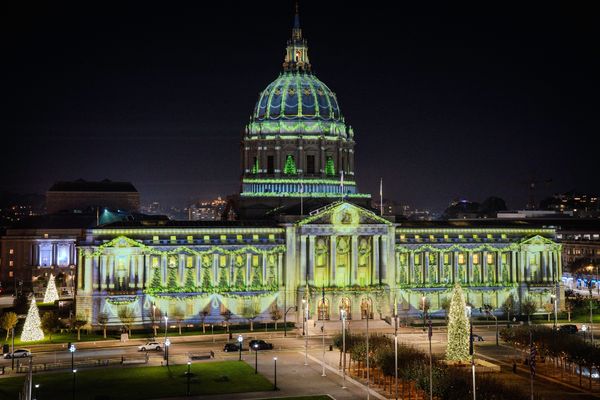Who is Henry Jaglom?
The answer is complicated enough to have inspired a 1995 documentary, in which conflicting portraits of the London-born director are offered. Is he “the worst filmmaker in America,” as one magazine editor suggested then? Or is he the daring auteur whose work has been described by Roger Ebert as “smart” and “sophisticated”? Do his films suggest a subconscious hatred of women, as a female sociologist once alleged, or do they reflect the “feminine, observant nature” some of his leading ladies profess to admire?
This much can be said for certain: Jaglom, 68, the self-financed writer-director whose 17th movie, the tender romantic comedy Irene in Time, arrives in San Francisco theaters this weekend, is not beholden to distributors or money men. His movies, whose stars have included Orson Welles, Jack Nicholson, David Duchovny and Vanessa Redgrave, are (for better or worse, depending on whom you ask) pure reflections of his creative vision. His production arm, the Rainbow Film Company, operates in a manner reminiscent of Hollywood’s Golden Age.
Perhaps that shouldn’t come as a surprise. Jaglom, who befriended the Citizen Kane director on the set of their 1971 venture A Safe Place, takes a decidedly old-fashioned approach to running his studio. (Jaglom drops pearls of Welles’ wisdom liberally in conversation, and, following their final professional collaboration on 1972’s The Other Side of the Wind, unsuccessfully sought funding for him to make another movie in the U.S.)
Jaglom, who cites Welles and Ingmar Bergman as influences, works quickly and prolifically. His muse of the moment, Tanna Frederick, whom he introduced in 2006’s Hollywood Dreams and recently signed to a second three-year contract, has done three plays and two movies with Jaglom, and they’re already preparing Queen of the Lot, a sequel to Dreams, for 2010. It’s a partnership founded, ironically, on a lie, but that doesn’t faze either in the least so long as their creative visions are fulfilled.
On the strange beginnings of a beautiful friendship:
HJ: Tanna totally hustled me. She was in play with a guy who’d had a small part in one of my films, and she wanted to meet me. The guy said, “Jaglom’s a sucker for anyone who goes on and on about how great one of his movies is.” So she wrote me this long, terrific, very intelligent letter about how much she loved my movie Déjà Vu. I called her up, and she continued to tell me all the reasons the movie was great, and I was flattered.
TF: I’ve seen the movie 20 times since then! I’m an honest girl cause of my Iowa upbringing. My Catholic guilt started to kick in, so I had to come clean.
HJ: Two movies and three plays later, she announced to me, “I think it’s time you know, I never saw the film.” Of course, it took two years for her Catholic guilt to kick in. But I loved it. I thought it was a bold move for an actor looking for work. It was a great hustle.
TF: And he’s a great filmmaker.
On their future working together:
HJ: You can expect a long line of movies with Tanna in them. She’s got amazing talent. She’s the Gena Rowlands to my Cassavetes, or the Liv Ullman to my Bergman.
TF: What about Jennifer Jones and David O. Selznick?
HJ: That was more of a business relationship.
On the inspiration for
Irene in Time, in which Frederick plays a singer mourning her late father and looking unsuccessfully for love:
HJ: Long before becoming the father of a baby girl myself in 1991, I had been fascinated by the complex relationship between fathers and daughters that I would see or hear about, the often profound effect that fathers seem to have on their daughters’ lives, often even long after the fathers themselves were gone.
So many women have told me, “I never got over my father,” or, “I married my father,” or, as Barbara Walters repeatedly wrote in her recent biography, “I could never be with him, he reminded me too much of my father.” Orson Welles stunned me one day as he sadly confessed out of the blue, “I never knew how to be a father to girls. I could have been a good father, I think, to boys, but I never knew how to do it with my three daughters.”
That is one theme that has been of lifelong interest to me. Here’s a second one. Ever since early childhood I have been fascinated – even obsessed may not be too strong a word – with movies in which, one way or another, love beats time. Portrait of Jenny. A Guy Named Joe. Here Comes Mr. Jordan. Stairway to Heaven. The Life and Death of Colonel Blimp. I have never quite gotten over the impossible and irresistible romances of these films.
On the dating books she ordered from Amazon.com to prepare for her role as an unlucky-in-love thirty-something:
TF: I was so glad to get those books out of my house and throw them in the fire. When you read these stupid books, if you’re not insecure before them, you will be a total mess when you’re done. I got so paranoid that I started questioning myself. I started worrying about my life. And yet all the books were so contradictory – there's The Rules of Dating, then there's The Real Rules of Dating, and there are even scientific approaches to dating. It felt good to get rid of them.
On the movies they’re planning to watch this summer:
HJ: Much to my amazement, Irene in Time opened up in a theater right next to the new Transformers movie, but that’s not my kind of movie. Tanna goes to those kind of movies.
TF: No, I don’t.
HJ: I’ve been watching the first season of The Sopranos again, and that’s a real pleasure. The film I saw recently that I loved was the incredible film with girl who has the pointy chin.
TF: Reese Witherspoon?
HJ: Yes, that’s the one. She was in that movie I just went crazy for about the inventor of Peter Rabbit.
TF: No, that was Renée Zellweger in Miss Potter! She played Beatrix Potter.
HJ: I cried my eyes out.
TF: I just don’t get that.
HJ: That’s because you’re a Transformers girl.
TF: No, I like Borat.
HJ: We both are dying to see Brüno.
On the accusation that Jaglom is difficult and that his fiction betrays a subtle hatred of women:
HJ: Let me give you a little background to start. I was up in East Hampton shooting a movie, and Martha Plimpton, a very wonderful actress, happened to be there. I asked her to be in the movie, she said fine. The thing I say to actors when we start is – and this might be my fault – I say to them, "You know the story, you know the script, you know the character, but don't worry that you can do anything wrong. You can improvise, you can create on the spot. If I don't like where it's going I'll stop it, but I want you to feel free to follow any impulse you have.
During the first scene we did together in Last Summer in the Hamptons, Martha was doing a scene and suddenly, fully clothed, she jumped in a pool. I said, "Cut! What are you doing?" She said that I'd told her she could do whatever she wanted to do. So I explained that this wasn't a big Hollywood movie, we didn't have time to get her new clothes or dry her hair, and that we'd have to move on to a new scene. I can't have actors altering their physical appearance in the middle of a scene. I just want them to follow their impulses. It was at that moment, with Martha fuming at me as I walked away, that the guys who made the documentary about me swooped in to talk with her. I just said, "Oh shit," because I knew nothing good could come of it.
As for hating women, that's crazy to me. The documentarians found some woman at a football game to say that. That was the most bizarre thing I've ever experienced. I don't know where they found that woman. I understand why the filmmakers included the footage – for them, that was gold. But to me, it was bizarre.
And Frederick's take?:
TF: It's a dream come true for any actor, working with Henry.
HJ: Do you want me to leave the room? I don't want you to feel constricted.
TF: No, I don't feel constricted. The actors who've worked with him before, when they come back to the set for the next movie, it's like a celebration. It's what the Actors Studio must be like, I imagine – an intense playground playground where, the more you do, the more Henry claps like a little five-year-old. It's just so fun. He's a delight to work with.
HJ: Thank you.




















